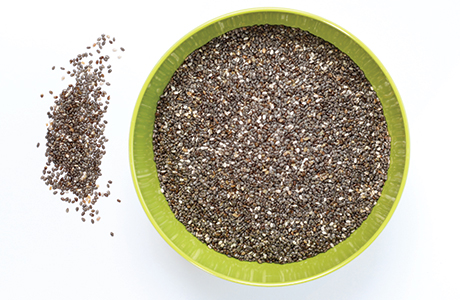Posted by Julia Reiss, CNP on 2015 Dec 14th
Remember when Chia was just pets?

To the Aztec and Mayan peoples, the word ‘Chia’ meant strength—not surprisingly, this crop helped these civilizations survive. It is a sustainable crop with a high germination rate, which means its relatively easy to grow. These fortunate cultures figured this out and chia became an everyday kind of item.
What I adore about Chia seeds is that they are high in oil—35% of each seed is oil. Of this oil, a full 20% of it is of the omega-3 variety. Which, as you may well be aware, is an essential fatty acid )(meaning the body can’t produce it on its own). Although omega-6 is also an essential fatty acid, it is not quite as special—this essential fatty acid is readily available in Western diets (in corn and soybean oil, for example) while omega-3 is not. As well, many of us have far too much omega-6 in our diets and unfortunately, omega-6 can contribute to inflammation throughout the body. Omega-3, however, actually helps reduce inflammation.
Do we always want to reduce inflammation? Not necessarily but the negative effects of inflammation on the body are varied and run the gamut from dangerous to relatively benign but they are almost always painful or uncomfortable to some degree. Heart disease, arthritis, acne, infections of all sorts, headaches, bronchitis, conjunctivitis—all of these and many more are made worse by attendant inflammation. Inflammation may even cause some major diseases. Scary, no? Cue hero music. Enter omega-3.
As a difficult-to-obtain-from-food fatty acid, omega-3 requires supplementation. Fish oil is the most popular form of supplemental omega-3, but Chia seed oil may be the best vegetarian option (it’s even higher in omega-3 than flaxseed oil). It also does not contain the potential contaminants, such as mercury, found in some fish oil.
Bonus? Chia seed oil is so full of antioxidants that it takes much longer to go rancid than most other oils. Even so, choose Chia seed oil packaged in a dark glass bottle to block the light (PRANA Chia oil is the one I use) and, as always, refrigerate your oils
Some things to keep in mind… And it’s not only the oil. Chia seeds contain calcium, iron, and magnesium, quite a bit of potassium, Vitamins A, B1, B2, and B3, phosphorus, manganese, copper, iron, molybdenum, niacin, and zinc.They’re also a fantastic addition to any weight-loss regime due to a high fibre content!
*Check out our Organic and Natural Chia Seeds - now available online

